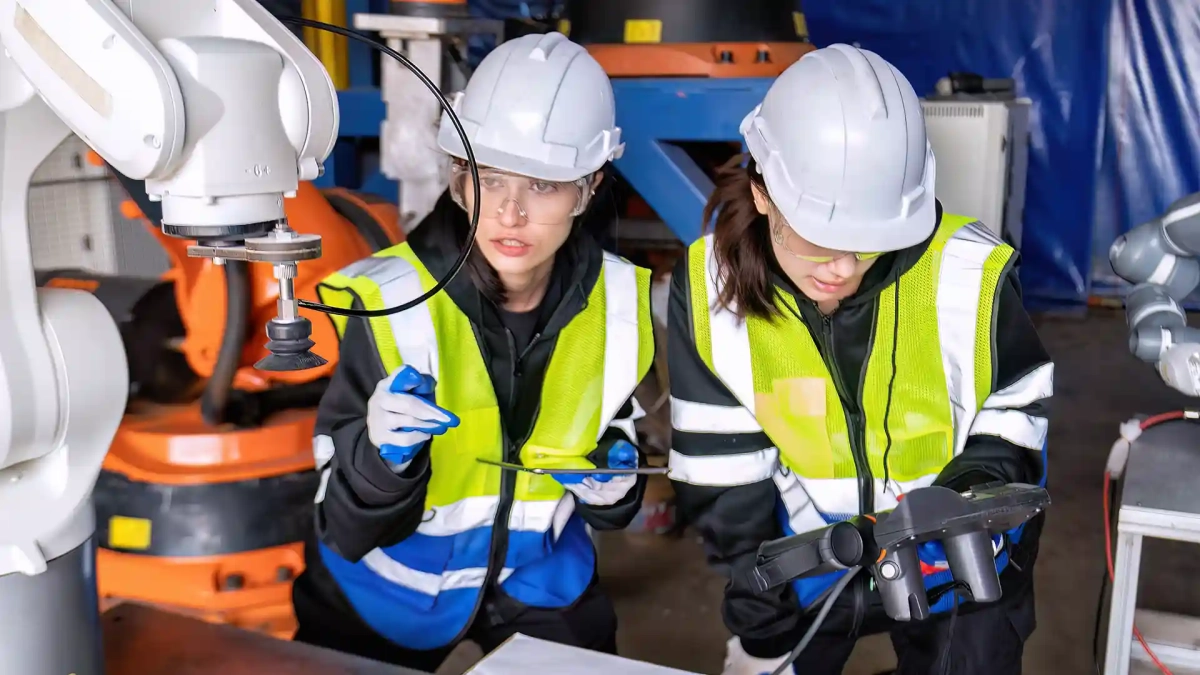Ausbildung Salary in Germany: What to Expect in 2025
- Ausbildung Salary in Germany: What to Expect in 2025
- What Is the Average Ausbildung Salary in Germany?
- Ausbildung Salary by Region: Where You Earn the Most
- Year-by-Year Salary Growth in Ausbildung Programs
- Looking for an apartment or a private room for rent in Berlin?
- 2025 Predictions for Ausbildung Salaries in Germany
- Ausbildung Or University: Which Offers Better Salaries?
- How Much Do Apprentices Take Home After Taxes?
- Bridging the Gender Pay Gap in Ausbildung Salaries
- Salary Trends Across Ausbildung Industries
- Career Growth After Completing Ausbildung
- Ausbildung Salary Trends and Future Prospects
- FAQ:
- What is the salary for Ausbildung in Germany?
- Which Ausbildung is best for foreigners?
- Can I get PR after Ausbildung in Germany?
- Can you quit Ausbildung?
- Can I get a job after Ausbildung in Germany?
- What is the salary of an Ausbildung nurse in Germany?
- Which course is highly paid in Germany?
- What is the highest paid vocational?
- Is Ausbildung in Germany worth it?
Germany’s vocational training system, known as Ausbildung, is a cornerstone of its workforce development. Combining theoretical education with hands-on experience, it prepares individuals for specialized careers across various industries.
Ausbildung equips apprentices with skills that directly align with job market needs, ensuring they are highly employable upon graduation.
This dual education system bridges the gap between academic knowledge and practical application, fostering a workforce that is not only skilled but also adaptable to changing industry demands.
A critical aspect of Ausbildung is the salary, which varies based on factors such as the chosen field, location, and year of training. Apprenticeships in high-demand sectors such as healthcare, IT, and engineering often come with higher salaries and better long-term career prospects.
Additionally, regional variations influence earnings, with apprentices in urban areas like Munich or Berlin typically earning more due to higher living costs.
Here, we explore how Ausbildung salaries differ across industries, regions, and years providing insights for those considering this pathway to a stable and rewarding career.
What Is the Average Ausbildung Salary in Germany?
In 2024, Ausbildung salaries range between €550 and €1,500 per month, with significant variation depending on the industry and year of training. Typically, the salary increases with each year of training to reflect the apprentice’s growing skills and contributions to the company.
Highest Paying Ausbildung Professions in 2024
- Technical and IT Professions: Fields like IT specialists and mechatronics technicians pay some of the highest apprenticeship salaries. Monthly earnings during training can range from €1,050 to €1,270, increasing in subsequent years.
- Healthcare: With a growing need for professionals, apprentices in healthcare fields, such as nursing, earn around €1,100 to €1,300 monthly, particularly in later years of training.
- Construction and Engineering: Professions like electricians or machine operators offer monthly salaries of €950 to €1,200, especially in regions with strong industrial activity.
- Hospitality and Retail: These sectors typically have lower apprenticeship salaries, ranging between €600 and €900 per month, reflecting the demand and lower specialization levels.
Ausbildung Salary by Region: Where You Earn the Most
Salaries during Ausbildung often depend on location, as economic conditions and industry density vary across Germany.
- Western Germany: Apprentices in cities like Munich, Frankfurt, and Stuttgart generally earn higher salaries due to strong economies and higher living costs. Monthly salaries here can go up to €1,500 in some industries.
- Eastern Germany: Apprentices in Leipzig and Dresden earn slightly lower wages, often starting at around €600 to €900 per month. This gap is narrowing as regional economies develop.
- Urban vs. Rural: Urban centers with higher living costs tend to offer better compensation compared to rural areas, where companies may struggle to compete.
Year-by-Year Salary Growth in Ausbildung Programs
Apprenticeships typically last 2 to 3.5 years, and salaries increase annually to reflect the apprentice’s growing experience.
- First Year: Salaries often range from €550 to €1,000, depending on the field.
- Second Year: Apprentices can expect a modest raise, with salaries rising to between €700 and €1,200.
- Third Year and Beyond: Earnings increase further, reaching €900 to €1,500 in many professions.
This incremental increase incentivizes apprentices to complete their training while supporting their financial needs.
Looking for an apartment or a private room for rent in Berlin?

- Affordable, Fully Furnished Options Available
- All Costs Included, No Hidden Fees
- Convenient Anmeldung & 6-Month Minimum Stay
- Hassle-Free Booking with KUMMUNI
- Excellent Customer Support Every Step of the Way
2025 Predictions for Ausbildung Salaries in Germany
Looking ahead, apprenticeship salaries are likely to rise in 2025 due to several key factors:
Minimum Wage Increase in Germany
The German federal government has announced a minimum wage increase to €12.82 per hour starting January 2025. This adjustment will likely influence apprenticeship salaries, pushing them higher to maintain competitiveness and meet legal requirements.
Rising Costs of Living
With the cost of living steadily rising, companies are expected to adjust apprenticeship salaries to remain attractive to candidates. Urban centers, where living costs are highest, are likely to see the largest increases.
Industries Facing Skilled Labor Shortages
Sectors like IT, engineering, and healthcare will continue to offer higher salaries to attract apprentices. For instance:
- IT apprentices could see starting salaries rise to €1,100 to €1,400 per month.
- Healthcare apprentices may earn between €1,200 and €1,500 in their later training years.
Government Initiatives Supporting Vocational Training
Ongoing efforts to promote vocational training as a viable alternative to university education are expected to include measures that encourage competitive salaries. This will ensure the system remains an attractive option for young professionals.
Ausbildung Or University: Which Offers Better Salaries?
One of the most significant advantages of an Ausbildung is the ability to earn while you learn. Unlike university students, who often face tuition fees and living expenses without an income, apprentices receive a monthly salary during their training. While university graduates may start with slightly higher salaries after completing their studies, they typically spend years accumulating debt and gaining no income. On the other hand, apprentices enter the workforce earlier and often have years of practical experience when university graduates are just starting.
For example:
- A university graduate in engineering might start with €3,500 per month after 5–6 years of study.
- A mechatronics apprentice could start earning around €2,800 to €4,000 monthly after 3–4 years of training, with no education debt.
This makes Ausbildung a financially viable choice, especially for students looking for a quicker path to financial independence.
How Much Do Apprentices Take Home After Taxes?
Apprentices’ salaries in Germany are subject to taxes, but the impact is generally minimal for lower-income brackets. For example:
- An apprentice earning €1,000 per month may only have to pay a small amount for social security, health insurance, and pension contributions, leaving them with a take-home pay of around €850–€900.
However, apprentices may qualify for certain tax benefits, such as allowances for travel expenses, work-related costs, or living away from home. These tax breaks can help maximize their disposable income, making it easier to afford basic needs during the training period.
Bridging the Gender Pay Gap in Ausbildung Salaries
Germany’s vocational training system strives to maintain fairness, but gender disparities in earnings and industry representation still exist. Fields like healthcare and retail, where women are more prevalent, often pay less than traditionally male-dominated fields like engineering and IT. However, initiatives promoting inclusivity are bridging this gap.
In recent years, programs have been implemented to encourage women to enter high-paying industries such as technology and construction. Apprenticeship salaries are also standardized within industries, meaning all apprentices in the same role receive similar compensation regardless of gender.
Salary Trends Across Ausbildung Industries
Adding graphs or tables can provide a visual understanding of salary trends across industries, regions, and years of training.
Table: Average Ausbildung Salaries by Industry (2024)
| Industry | First Year (€) | Second Year (€) | Third Year (€) |
|---|---|---|---|
| IT and Technology | 1,100 – 1,200 | 1,200 – 1,300 | 1,300 – 1,500 |
| Healthcare | 1,000 – 1,100 | 1,100 – 1,250 | 1,250 – 1,400 |
| Engineering & Mechatronics | 950 – 1,150 | 1,150 – 1,300 | 1,300 – 1,500 |
| Retail | 600 – 800 | 700 – 850 | 800 – 950 |
| Hospitality | 600 – 750 | 700 – 800 | 750 – 900 |
Career Growth After Completing Ausbildung
An Ausbildung isn’t just about short-term earnings—it sets the stage for long-term career success. Many apprentices transition into full-time roles with their training company, often with above-average starting salaries. In some cases, they pursue further certifications, allowing them to advance to managerial or specialist roles.
Career Progression Example:
- An IT apprentice starts at €1,200 per month during training.
- After completing the program, they earn €3,000–€4,000 as a junior developer.
- With additional certifications, they can become a senior developer earning €6,000+ monthly.
Such growth opportunities make Ausbildung a competitive alternative to university degrees.
Ausbildung Salary Trends and Future Prospects
With competitive salaries, practical training, and significant long-term growth potential, Ausbildung remains a popular and financially sound choice in Germany. The added benefits of tax breaks, inclusivity efforts, and steady salary progression make it even more appealing. As industries adapt to new economic conditions, the earning potential for apprentices in 2025 and beyond is expected to continue rising, offering even greater incentives for young professionals to pursue vocational training.
FAQ:
What is the salary for Ausbildung in Germany?
Apprentices in Germany earn gross salaries between €550 and €1,500 monthly during their Ausbildung, depending on the industry and region. Net pay typically ranges from €450 to €1,200 after taxes.
Which Ausbildung is best for foreigners?
The best Ausbildung programs for foreigners are in high-demand fields like IT, healthcare, and engineering. These industries often offer better salaries, career growth opportunities, and easier entry into the job market.
Can I get PR after Ausbildung in Germany?
Yes, you can apply for permanent residency (PR) after completing an Ausbildung if you secure full-time employment and meet residency and financial requirements.
Can you quit Ausbildung?
Yes, apprentices can quit their Ausbildung, but it is recommended to discuss issues with employers or advisors first, as quitting may impact future career opportunities.
Can I get a job after Ausbildung in Germany?
Yes, most Ausbildung graduates secure jobs immediately after completing their training, often with the same employer, especially in high-demand fields like IT and healthcare.
What is the salary of an Ausbildung nurse in Germany?
Apprentice nurses earn between €1,100 and €1,300 per month during their Ausbildung, with salaries increasing in later years of training.
Which course is highly paid in Germany?
IT and engineering Ausbildung programs are among the highest paid, with monthly salaries reaching up to €1,500 during training.
What is the highest paid vocational?
Mechatronics technicians, IT specialists, and industrial mechanics are among the highest-paid vocational roles in Germany, offering salaries of €1,200 to €1,500 during Ausbildung.
Is Ausbildung in Germany worth it?
Yes, Ausbildung offers practical skills, early career entry, and financial independence, making it a great option for many, especially in high-demand sectors like healthcare and technology.
How informative was this article?
Click on a star to rate it!
We are sorry that this post was not useful for you!
Let us improve this post!
What is missing in the article?















